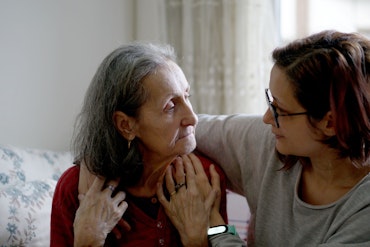The number of Australians with dementia is expected to double by 2058
A health report released by the Australian Institute of Health and Welfare highlighted concerning trends about the number of Australians with dementia
![<p>Recent estimates suggest that the number of Australians living with dementia could double in the next 34 years. [Source: Shutterstock]</p>](https://agedcareguide-assets.imgix.net/news/articles/wp/sadwoman0307.jpg?fm=pjpg&format=auto&w=550&q=65)
Recent estimates suggest that the number of Australians living with dementia could double in the next 34 years. [Source: Shutterstock]
Key points:
- Recent estimates suggest that more than 849,300 Australians will be living with dementia by 2058, as per the Australian Institute of Health and Welfare
- Dementia Australia Chief Executive Officer Professor Tanya Buchanan expressed concern regarding community awareness of dementia and the supports currently available
- The University of Tasmania has released a free online course called Understanding Dementia to improve Australians’ understanding of dementia
More than 849,300 Australians are expected to have dementia by 2058, according to the latest data from the Australian Institute of Health and Welfare.
The Australian Institute of Health and Welfare recently released a summary report on Australians’ health, causing concerns regarding insufficient support and community understanding of dementia.
Dementia Australia Chief Executive Officer Professor Tanya Buchanan commented on the recently published report and expressed the need for better support and interventions for people living with dementia in Australia.
“The report provides vital information for governments and the health, aged care and disability sectors to ensure there is investment in appropriate dementia supports and services,” Professor Buchanan said.
“The data also provides compelling evidence of the need for further funding commitments to dementia research, increasing community awareness and a strategic public health approach to dementia prevention.
“The latest research tells us that with increased awareness of the modifiable risk factors across populations and over time, we could be delaying or potentially preventing 40 percent of dementia cases.”
Over 411,000 Australians are living with some form of dementia, according to the latest estimates from the Australian Institute of Health and Welfare. Alzheimer’s disease is the most common form of dementia and up to 70 percent of people with dementia have been diagnosed with Alzheimer’s disease.
While symptoms of dementia can vary depending on the cause and type, cognitive and psychological changes are common.
Some cognitive changes may include memory loss, confusion or difficulties with communication. Agitation, depression or inappropriate behaviour may indicate psychological changes as a result of dementia.
Relationships with others may also change when a person experiences symptoms of dementia, causing conflict due to misunderstanding. For example, inappropriate behaviour may concern or surprise family or friends. However, realising that behaviour changes are symptoms of dementia and that increasing your understanding of your loved one is helpful.
The Department of Health and Aged Care expects that the National Dementia Action Plan will ‘establish practical actions to improve the experiences of people living with dementia and their carers.’
Professor Buchanan reiterated the importance of finalising the National Dementia Action Plan to better support people with dementia.
“Dementia Australia and people living with dementia, their families and carers have contributed to the development of the next iteration of the draft National Dementia Action Plan and we eagerly await its release,” she said.
Government officials are collaborating with groups such as researchers, peak bodies and people with lived experience to finalise the plan. While there are no set dates for when the plan will be announced, the Department of Health and Aged Care expects it to be implemented later this year.
Professor Buchanan highlighted the relevance of organisations such as Dementia Australia that can help inform, support and advocate for people with dementia and their families
“With more than 421,000 people living with dementia in Australia and more than 1.6 million people involved in their care, it is essential that all Australians know that no matter who you are or how you’re affected by dementia, Dementia Australia is here for you,” she said.
To increase Australians’ knowledge about dementia, the University of Tasmania has released a free course, known as a Massive Open Online Course, called Understanding Dementia. The target audience includes health professionals, community support workers and people with loved ones living with dementia.
The free course contains seven weeks of scheduled content and quizzes, with a certificate of completion available when you complete the course. Participants are expected to engage in around three hours of course engagement per week.
To read more about this course and understand how the University of Tasmania is improving awareness of dementia, head to this article: Older Australians face a growing concern: do you know enough?
Researchers are also looking for older Australians to participate in a study to determine the impact of physical activity on brain health and dementia risk.
Participants who complete the program will be given a Fitbit as reimbursement. More information about this study can be found in this article: Free Fitbit for eligible older Australians.
If this story has prompted any questions or concerns, please call the National Dementia Helpline on 1800 100 500 (24 hours, 7 days a week) or visit dementia.org.au.
How would a National Dementia Action Plan improve the life of someone you know with dementia?
Let the team at Talking Aged Care know on social media.
For more information and news in the aged care industry, subscribe to our free newsletter.
Relevant content:
Free Fitbit for eligible older Australians
Older Australians face a growing concern: do you know enough?























